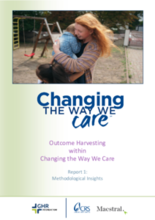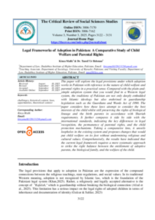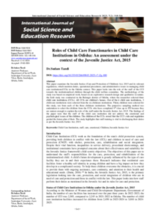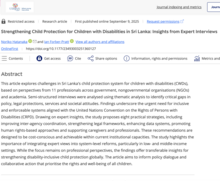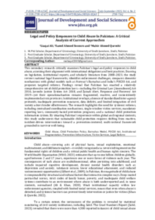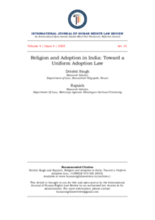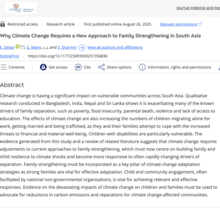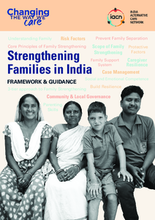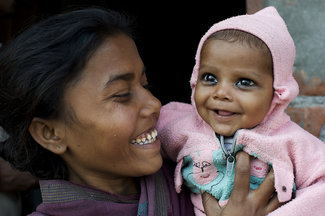

Displaying 21 - 30 of 746
At the close of the Changing the Way We Care (CTWWC) The Changing the Way We Care (CTWWC) initiative launched in 2018 with the aim to reform child care systems by promoting safe, nurturing family-based care over institutional ca
This paper examines the legal framework governing adoption in Pakistan, highlighting how Islamic principles and the Guardians and Wards Act of 1890 shape the balance between child welfare and parental rights. Through a comparative analysis with international standards, it identifies gaps in the current system and proposes reforms to better protect children’s best interests while respecting cultural and religious values.
This paper examines the Juvenile Justice (Care and Protection of Children) Act, 2015, and its regulations in the context of child care institutions (CCIs) in Odisha, focusing on the role of CCI staff in supporting institutionalized children through the child welfare committee. Findings from a qualitative study of three children’s homes in Balangir district indicate that staff often fail to address children’s emotional and psychological needs, highlighting the importance of staff training to effectively fulfill duties under the Juvenile Justice Act.
This study explores the experiences of exploited orphans in institutional care in India and the factors that contribute to their cognitive resilience, using qualitative interviews with 20 children aged 12–16. Findings show that resilience is shaped by problem-solving skills, goal setting, self-regulation, peer support, education, and stable caregiving, highlighting the need for policies and interventions that strengthen both individual and environmental supports.
This article examines challenges in Sri Lanka’s child protection system for children with disabilities, drawing on insights from 11 professionals to identify critical gaps in policy, services, and societal attitudes. It proposes eight practical, cost-conscious strategies to strengthen disability-inclusive protection aligned with the UN CRPD, offering lessons for global child protection reform.
This study reviews Pakistan’s legal and policy responses to child abuse, noting that while comprehensive laws exist, enforcement remains fragmented and inconsistent across provinces. It calls for systemic reforms—including centralized coordination, victim-centered services, mandatory reporting, and stronger prevention measures—to move from reactive responses toward a sustainable, multi-sectoral child protection framework.
India’s adoption laws have evolved over more than a century, creating parallel systems that affect eligibility, speed of adoption, and the rights of adoptive families. This study examines the historical origins and gaps in these laws and advocates for a unified framework that aligns with constitutional and international standards.
Research across Bangladesh, India, Nepal, and Sri Lanka shows that climate change is intensifying drivers of family separation—including poverty, food insecurity, child migration, early marriage, and trafficking—while placing children with disabilities at heightened risk. The study calls for family strengthening to be a central pillar of climate adaptation strategies, emphasizing resilience-building, child and community engagement, and advocacy for both emission reductions and reparations for affected communities.
This statement by UNICEF Deputy Executive Director for Humanitarian Action and Supply Operations Ted Chaiban notes how the rapid pace of returns to Afghanistan—peaking at over 50,000 arrivals in a single day—has overwhelmed fragile communities.
Strengthening Families in India: Framework & Guidance, jointly developed by India Alternative Care Network (IACN) and Changing the Way We Care (CTWWC), aims to consolidate existing knowledge, interventions, and promising practices led by government bodies and civil society organizations across India.

